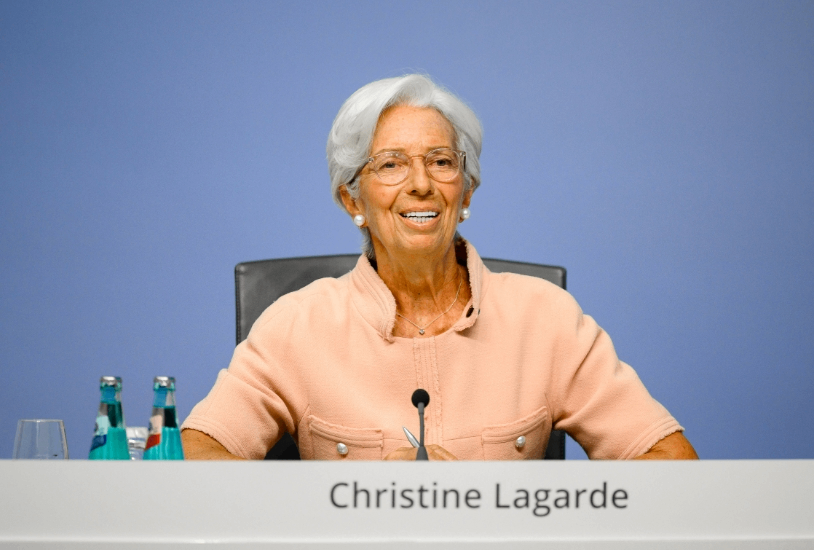At the hearing, Lagarde explained three key issues in the eurozone
The European Central Bank still chooses to continue its high-pressure attitude towards inflation, which has recently been criticized by more and more economists.。
Recently, European Central Bank President Christine Lagarde said at a hearing of the European Parliament's Committee on Economic and Monetary Affairs that the euro zone's economy will weaken further in the third quarter。
Economic activity: further weakness in the third quarter
During the hearing, Lagarde said that economic activity in the euro zone stagnated in the first half of 2023 and that recent indicators showed further weakness in the third quarter.。Lagarde went on to say that falling export demand in the euro area and a tightening financing environment were dampening growth.。Services are also weakening, and job creation in services is slowing。
According to data released by IHS Markit, the initial value of the Eurozone Composite Purchasing Managers Index (PMI) in September was 47.1, the manufacturing PMI is 43.4, services PMI recorded 48.4, the three PMI data are in the contraction range。Among them, the eurozone's manufacturing PMI index has been below the boom-bust line for 15 consecutive months, worrying。
Amid the economic malaise, while the euro zone's private sector continued to expand its workforce in September, the problems of overcapacity and weak consumption in the market have been slow to be resolved。In addition to this, the input costs of these private companies have risen sharply in the recent past due to higher energy prices and salary increases resulting from employee strikes, seriously dampening the dynamism of these economies。
In the face of the current situation of economic contraction, on September 11, the European Union in the latest European economic summer outlook report, lowered the European Union and the euro zone economic growth forecast for this year and next, said the first half of this year, the EU economic activity has been suppressed, the second half of economic growth will continue to slow down。The report expects both the EU and eurozone economies to grow by 0% in 2023..8%, the EU and Eurozone economies will grow by 1% each in 2024..4% and 1.3%。
Inflation: Price pressures remain high
Turning to inflation, Lagarde said that overall inflation in the euro area continued to fall from its peak in October last year, but that price pressures remained high and would remain at excessively high levels for an extended period of time.。Inflationary pressures in the euro area are expected to moderate over the next two years, from 5 in 2023..6% to 3 in 2024.2%, down to 2 in 2025.1%。
Lagarde is right, according to data released by Eurostat on September 19, although the euro zone's annual inflation rate is already 10% higher than its peak in October 2022..6% peak halved, but also reached 5.2%, the price pressure is really great。
To combat persistently high inflation, the ECB has taken unprecedented monetary tightening measures, raising its main refinancing rate, deposit facility rate and marginal lending rate by 25 basis points to 4 basis points each on September 14..5%, 4% and 4.75%。
Since July last year, the European Central Bank has raised interest rates 10 times in a row, a total of 450 basis points.。
Monetary policy: to be assessed based on economic and financial data
The European Central Bank's interest rate hike action greatly exceeded market expectations, the original market believes that in the "high interest rates, high inflation" hit, the bank will stay put in September, giving the market some breathing space。However, the European Central Bank still chooses to continue its high-pressure attitude towards inflation, which has recently been criticized by more and more economists.。
In its interest rate decision, the ECB did not even discuss how long high rates would last。According to the ECB, based on current assessments, the ECB Governing Council believes that the ECB's key interest rate has reached a level that can be maintained for a long enough period of time, and that data will determine the extent and duration of policy restrictions.。
In this hearing, Lagarde once again on the future of monetary policy views。She noted that, according to the latest assessment, the ECB believes that the policy rate has reached a level that, if held for long enough, will make a significant contribution to the timely return of inflation to its target.。The ECB will assess and decide on the inflation outlook based on economic and financial data, underlying inflation dynamics and the strength of monetary policy transmission.。
Lagarde said governments should continue to scale back energy-related support measures to avoid pushing up medium-term inflationary pressures。At the same time, fiscal policy should aim to increase the productivity of the eurozone economy and gradually reduce the high level of public debt.。a sound economic governance framework is in the common interest and an agreement on the reform of the eu's fiscal framework should be reached by the end of this year, she said。

·Original
Disclaimer: The views in this article are from the original Creator and do not represent the views or position of Hawk Insight. The content of the article is for reference, communication and learning only, and does not constitute investment advice. If it involves copyright issues, please contact us for deletion.